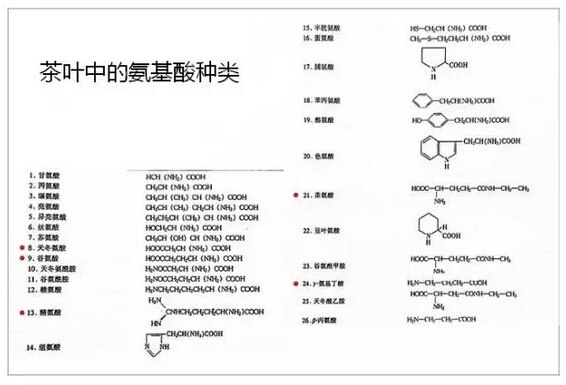On a warm afternoon,
brewing a cup of rare white tea,
watching the fresh leaves rise and fall in the cup,
and letting a fresh fragrance linger between your lips and teeth
can instantly boost your happiness.

The upcoming white tea not only has unique qualities like green stems, white leaves, sweet and clear taste, and rich aroma but also contains high levels of amino acids, various vitamins, and trace elements, making it an ideal health beverage.
So, the question arises:
How beneficial are the high levels of amino acids in tea?
First, let's understand the amino acids in tea.

There are 26 types of amino acids in tea. Besides the 20 protein amino acids found in free amino acids, six non-protein amino acids have also been detected (theanine, γ-aminobutyric acid, djenkolic acid, glutamylmethylamide, asparagine ethyl ester, and β-alanine). Among them, theanine accounts for 1-2% of the dry weight of tea and 70% of all free amino acids. It is a unique amino acid in tea, contributing to the fresh and sweet taste while mitigating bitterness.
What are the effects of these amino acids in tea?
1. Calming the mind and improving learning and memory
The amino acid content in white tea ranges from 6% to 7%, twice that of ordinary green tea, while the polyphenol content is between 10% and 14%, with a phenol-to-amino acid ratio of only 1.6 to 2.3. This enhances the tea's freshness and mellow taste.
L-theanine activates neurotransmitters responsible for learning and memory. Upon entering the brain, it significantly increases dopamine levels in brain mitochondria, calming the mind and improving learning and memory.
2. Boosting immunity
High levels of amino acids not only protect nerve cells and aid in brain injury recovery but also promote interferon secretion by immune cells in the blood, enhancing the body's resistance to external threats.
3. Anti-aging and liver/stomach protection
Anji white tea contains various amino acid compounds and diphenylamine from tea lipids, which protect the liver and stomach, promote the liver's synthesis of clotting factors, and have anti-aging effects.

In addition to amino acids, other intrinsic components in tea are also highly beneficial.
>>>> Anti-radiation, blood sugar reduction, and antioxidant effects
Polysaccharides in tea have anti-coagulation, anti-thrombosis, anti-radiation, lipid-lowering, and blood pressure-lowering effects. Tea lipopolysaccharides can precipitate absorbed radiation (e.g., from computers) and expel it from the body. They also significantly inhibit oxidative hemolysis in human red blood cells, demonstrating strong antioxidant properties.
>>>> Eye protection and fatigue relief
Containing trace elements like manganese, zinc, and selenium, as well as vitamin C, tea reduces lens opacity, relieves nervous tension, and eliminates fatigue, protecting eyesight.
However, tea is just tea. While it has various medicinal effects, developing a tea-drinking habit and consuming it scientifically, along with maintaining a regular routine and exercise, will yield better health results.